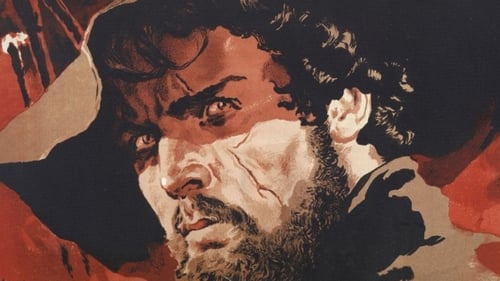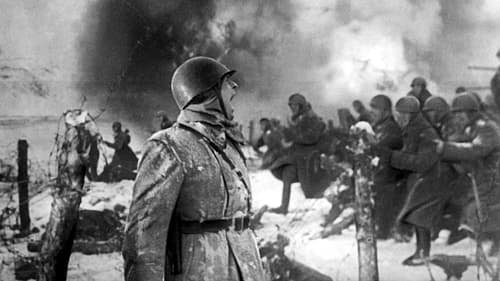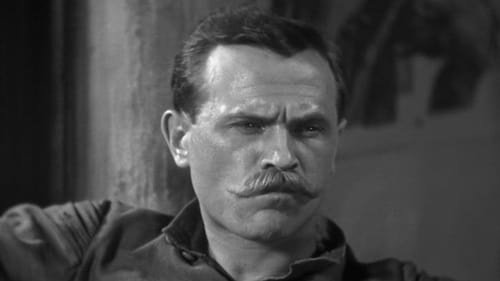Nikolai Simonov
Birth : 1901-11-21, Samara, Russian Empire [now Russia]
Death : 1973-04-20

Yakov

Sotnikov
Leonid Pleshcheyev returned from the war blind. Against his will, he became a dependent. He drowns his grief in unrestrained drunkenness, thereby tormenting his wife Mariya and his teenage son Lyonka. Mariya finally decides to take her son and leave for Altai, but the boy runs away and returns to his father. So, together, they eke out a half-miserable existence until Grigoriy Shalagin, Pleshcheyev's longtime friend, returns from the army. It is he who awakens in Leonid the extinct self-esteem and pride of a soldier. Pity aside, he helps him get back to work.

Иван Северьянович Флягин

Harlampy
An old fisherman spends his days waiting to hear from his son who left the village long time ago.

Prof. Salvator
People living at a seashore town are frightened by reports of an unknown creature called "the sea devil". Nobody knows what it is, but it's really the son of doctor Salvator. The doctor performed surgery on his son and now young Ichtiander can live under water. This gives him certain advantages, but also creates a lot of problems.

voiceover
It is year 1900 in Pre-Revolutionary Russia and Deacon Olympius begins to take interest in secular literature. When he stumbles upon a book by Tolstoy, he is humbled and inspired to lead a just life. Based on a story by Aleksandr Kuprin.

professor Peskov
A drama about a daily life of a doctors in a military hospital.

Cardinal Montanelli
Italy, XIX century. The country is occupied by Austrian troops, the resistance movement is actively developing. Student Arthur Burton is involved in the activities of the underground organization “Young Italy”, envies its leader, Giovanni Bolla, and is jealous of his bride Gemma. He talks about this at a confession to a priest, as a result of which gendarmes take revolutionaries under arrest...

Heroes of Shipka was the first solo effort for Soviet director Sergei Vasilyev, who had previously collaborated with his late brother Georgi. As head of the Leningrad Film Studios, Vasilyev was obliged to traffic in propaganda, but he never forgot how to make his material entertaining. The film is set in 1887 during the pivotal battle between the Russians and the Turks at the Shipka Pass. Stressing the solidarity of the Soviet states, tribute is paid to the courageous Bulgarian volunteers who helped the Russians fend off their mutual enemy. American critics were impressed by Heroes of Shipka, but felt that the film would have been twice as effective had it been lensed in Cinemascope rather than "standard aspect."

Fyodor Vasilievich Protasov (Fedya)
Based on the play of the same name by Leo Tolstoy.
The Russian nobleman Fyodor Vasilievich Protasov cannot put up with the hypocrisy of his environment, but is powerless to fight it. He begins to drink, leaves the house and gradually falls. The behavior of Protasov helps to bring his wife Liza closer to a longtime friend of the family, Viktor Karenin. Unable to endure the lies and humiliation associated with the upcoming divorce proceedings, Fedya pretends to commit suicide and seemed to forever leave his family. It is only due to the accident that it becomes known that Fedor Protasov is alive. Liza, reconciled with the death of her husband and became the wife of Karenin, is summoned to court on charges of duality. To stop the stupid and deceitful comedy of the court and rid the shame of innocent people, Protasov shoots himself.

Lt. Gen. Churkov
A 1949 two-part Soviet epic war film about the Battle of Stalingrad, directed by Vladimir Petrov. The script was written by Nikolai Virta.

Малеев

(archive footage)

Ilya Golovin
A story about the adventures of young boy Kolya Novikov who runs from his home in order to get to the border where his older brother was killed.

Tsar Pyotr I
Depicts Russian Tsar Peter the First's conquest over the Swedes and his son Aleksey's plot to overthrow him.

Tsar Pyotr I
This, the first Soviet depiction of Peter the Great, set the stage for what would become the post-Revolutionary line concerning the early Romanovs. Rulers like Ivan the Terrible and Peter the Great were widely admired for their dedication to Russia and their absolute determination to enhance her position in the world. But praise for the hated later Romanovs conflicted too heavily with the very beliefs that had brought about the Revolution in 1917.

Writer
Aerograd is a 1935 Soviet film by Ukrainian director Olexander Dovzhenko, Mosfilm-VUFKU coproduction. It is a futuristic adventure story set in the Soviet Far East. Considered one of two sound masterpieces by Dovzhenko, the other being "Ivan".

A Soviet comedy about a charming womanizer.

Zhikharev
This film is based on the book about Vasili Ivanovich Chapaev (1887 - 1919) who was in real life the Commander of the 25th Division of the Red Army. Chapaev is an uneducated peasant and a decorated hero in the World War I and later in the Russian Civil War, that followed the Russian revolution. This man of action is fighting on the side of the poor people. His troops consist of peasants, just like him. Unable to write, he can brilliantly demonstrate various battle tactics by moving potatoes on the table. He is street smart. He never lost a battle against the experienced Generals of the Tzar's Army.

Artem
Pavel Petrov-Bytov was an enfant terrible of the highbrow Leningrad Sovkino film factory. He was notorious for his article “We Have No Soviet Filmmaking,” in which he criticized all the achievements of the Soviet avant-garde. In spite of his beliefs and his scandalous struggle with “bourgeois” and “formalist” filmmaking, Petrov-Bytov directed an aesthetically refined work, shot entirely on set with masterful chiaroscuro lighting: a perfect example of “Soviet expressionism.” Based on a Maxim Gorky story, the plot of Cain and Artem provides a wake-up call to the Russian people to overcome alcoholism and religious factionalism, as it spotlights the (many) drunken denizens of a typical village and their disregard for the Jewish shoemaker Cain.

Grigory Orlov, Count
An adaptation of Pushkin's historical novel about the Pugachev's Rebellion in 1773–1774.

Kastus Kalinovskiy
Kastus Kalinovskiy - a feature film. Was released on August 14, 1928. The picture shows one of the heroes of the uprising of the Belarusian, Lithuanian and Polish people against forced Russification and the restoration of Poland's independence in 1863.

Сергей
Katerina murders her husband and her father-in-law. She and her new beau are both sent to Siberia, where the lover almost immediately takes up with a younger woman.

Engineer Dukalsky arrives from Moscow on the instructions of an underground anti-Soviet center to the Baltic Shipyard in order to take possession of the blueprints of a powerful ship engine. The pest meets the author of the project - a young and incorruptible self-taught master Ivanov. After a series of unsuccessful attempts to buy out or steal the drawings from the author, Dukalsky decides to take Ivanov with him. Criminal Investigation Officers will attack the trail of criminals.

















